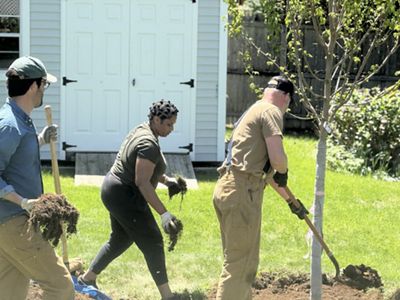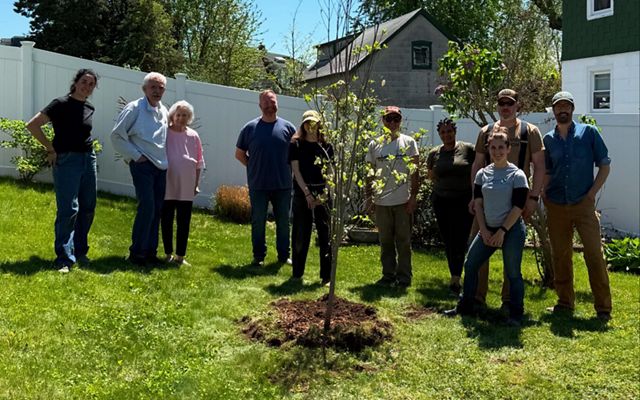
The Nature Conservancy Plants 40 Trees in Groton
The planting represents one way TNC is standing up to stormwater in Connecticut.
Media Contacts
-
Susan Wollschlager
The Nature Conservancy
Phone: 203-209-6218
Email: s.wollschlager@tnc.org
It is only fitting that Shirley Dunbar Rose loves nature. And her appreciation goes far beyond the flower of her last name.
She was thrilled when she heard about a tree planting effort in her Connecticut neighborhood spearheaded by The Nature Conservancy. Residents of the City of Groton could sign up to receive a free tree in their yard, delivered and planted by TNC staff and volunteers, as well as municipal representatives.
“I just think that for the environment, it’s great. That’s why I’m interested. I like trees. I like nature. It’s a wonderful program, and it’s great the town is taking part,” Rose said.
TNC planted 40 trees in residents’ yards, including Rose’s, across multiple planting days in spring and fall as part of a project aimed at reducing stormwater flooding in the City of Groton. Residents chose from a variety of native trees to receive, including dogwoods, red maples, eastern redbuds and pin oaks.




“When you’re thinking about the watershed overall, trees help to manage water. This is complementary to the stormwater studies we’ve been doing,” said Anjali Khanna, conservation coordinator for TNC’s Resilient Southeastern Connecticut program.
Trees are the ultimate multi-taskers. They soak up stormwater, provide shade and help to control temperature on hot days, provide homes for wildlife, support biodiversity, filter pollutants from the air, and create inviting and walkable neighborhoods. They’ll be doing all of this and more in the City of Groton.
And so TNC arrived with young trees, shovels, hand trucks and mulch—because these weren’t tiny seedlings you could hold in your palm. The team dug holes double the size of the trees’ root balls, so big you could stand in them.
“It’s one way to maintain the root ball and seen as a best practice for this sort of planting. It’s heavy for moving and they need a large hole. But it offers a better survival rate,” said Drew Goldsman, TNC's urban conservation director in Connecticut.
Soil and mulch were placed around the trees in the shape of a donut, as a way to help hold all the water needed by these youngsters until leaves drop—about 25 gallons per week for “leaf on” season, that residents agree to provide.
TNC has worked extensively with the City of Groton, including the development of the Southeastern Connecticut Regional Framework for Coastal Resilience, as well as the city’s Community Resilience Plan, released in May 2022.
The tree-planting and stormwater assessment continue this work, thanks to a $361,080 grant funded by the Environmental Protection Agency through the National Fish and Wildlife Foundation. The stormwater assessment is addressing longstanding issues from stormwater flooding in the Five Corners neighborhood and developing nature-based solutions.
“Stormwater flooding in Five Corners is a critical issue for residents and the city’s workforce. We’ve seen infrastructure pushed beyond its limit by the volume of water in the area,” adds Timothy Clark, program director of the Resilient Southeast Connecticut program. “This grant gives TNC and Groton a fantastic opportunity to unlock restorative actions identified by the city in their Community Resilience Plan.”
The Nature Conservancy is a global conservation organization dedicated to conserving the lands and waters on which all life depends. Guided by science, we create innovative, on-the-ground solutions to our world’s toughest challenges so that nature and people can thrive together. We are tackling climate change, conserving lands, waters and oceans at an unprecedented scale, providing food and water sustainably and helping make cities more resilient. The Nature Conservancy is working to make a lasting difference around the world in 83 countries and territories (39 by direct conservation impact and 44 through partners) through a collaborative approach that engages local communities, governments, the private sector, and other partners. For more news, visit our newsroom or follow The Nature Conservancy on LinkedIn.